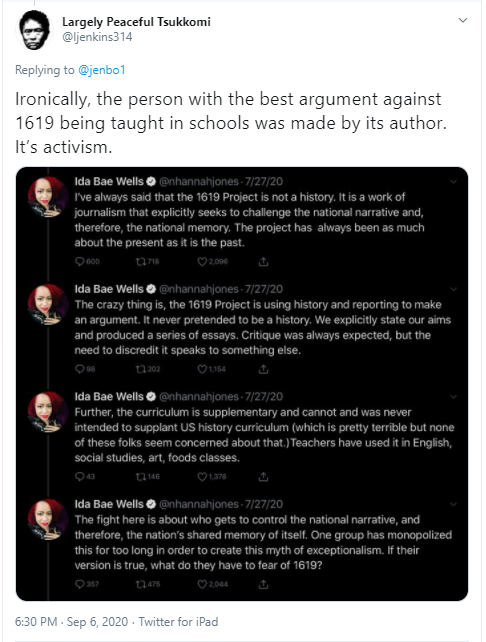Creator Ida Bae Wells argues that the 1619 Project should be “taught” yet she also admits that it is not “a history.” Is she saying that it is not true? Is she saying that ideology should be taught in our schools?
Here are some of her own words:
Here is one more Tweet:
1619 is clearly a false history:
The project has sparked criticism and debate among prominent historians and political commentators.[5][6] In a letter published in The New York Times in December 2019, historians Gordon S. Wood, James M. McPherson, Sean Wilentz, Victoria Bynum and James Oakes expressed “strong reservations” about the project and requested factual corrections, accusing the project of putting ideology before historical understanding.
John McWhorter summarizes some of the many problems with the 1619 project:
The New York Times’ 1619 Project is founded on empirical sand. The fundamental claim that the Revolutionary War was fought to preserve slavery simply does not correspond with the facts, too conclusively for the point to be dismissed as mere hair-splitting. The issue is not differing interpretations of history, but an outright misinterpretation of it.
Yet the project lives on. Its spearheaders blithely dismiss the charges of inaccuracy as mere natterings that at least verge on racism, while school districts nationwide eagerly received pedagogical materials based on the idea of offering students a fresh, revealing take on American history.
We must ask: Is there some broader aspect of the 1619 Project that justifies a certain slippage between its claims and actual fact? Just what does this project have to teach students? What does it have to teach us? And if the answer to those questions is “nothing much,” then how is it that brilliant, high-placed people can be so serenely unruffled in promulgating this material to innocent young minds?
In the end, the 1619 Project is more than a history lesson. It is founded on three basic principles, none expounded with a great deal of clarity, but all of them pernicious to a truly constructive black American identity.
…
To accept the implication of the 1619 ideology that heroic figures should be dismissed for not fully understanding the horrors of slavery, and that the American story is defined by nothing except the treatment of black people, would be to disrespect them as infantile minds. As such, we must evaluate the project on what it portends for forging socio-political change. Sadly, here the project would seem to yield nothing. A revivification of the reparations argument is longer on theatre than politics. The concern with whites understanding that “It isn’t our fault” may seem a form of political engagement but in fact is quite irrelevant to change in actual lives. . . . evaluated honestly, the 1619 Project is a kind of performance art. Facts, therefore, are less important than attitude. Hannah-Jones has predictably dismissed serious and comprehensive empirical critiques, as if for black thinkers, truth is somehow ranked second to fierceness and battle poses. For many, questioning the 1619 Project elicits irritation, of a kind that suggests personal insult rather than difference of opinion. This is because the 1619 Project is indeed all about personality, a certain persona that smart black people are encouraged to adopt as a modern version of being a civil rights warrior.
For this 2.0 version of civil rights warrior, authentic blackness, significant blackness, requires eternal opposition, bitter indignation, and claims of being owed. Whether all of this is rooted in reality in a way that can create change for actual human beings is of less concern than whether all of this is expressed, on a regular basis. It keeps The Struggle going, we are told.




Andrew Sullivan:
The 1619 Project is a case in point. It doesn’t just expose some of the hideous past we’d rather forget. It insists that “white supremacy” is the definition of the United States, that its true founding was therefore 1619, that its core principle from the get-go was not freedom but slavery, that slavery is the true basis for American wealth, that the police today are the inheritors of slave patrols, that only black Americans fought to end slavery, and so on. It insists that the Declaration of Independence was “false”, not merely imperfectly implemented, and designed to obscure the real project of racist oppression. And its goal is the dismantling of liberal epistemology, procedures, ideas and arguments in order to revolutionize what cannot by definition be reformed.
This is what makes CRT different. When it began, critical theory was one school of thought among many. But the logic of it — it denies the core liberal premises of all the other schools and renders them all forms of oppression — means that it cannot long tolerate those other schools. It must always attack them.
An excerpt from an article by Sean Wilentz, a Princeton University historian “whose academic work is broadly respected across the political spectrum.”
https://www.nationalreview.com/corner/sean-wilentz-fires-back-on-the-1619-project-and-the-climate-of-anti-history/